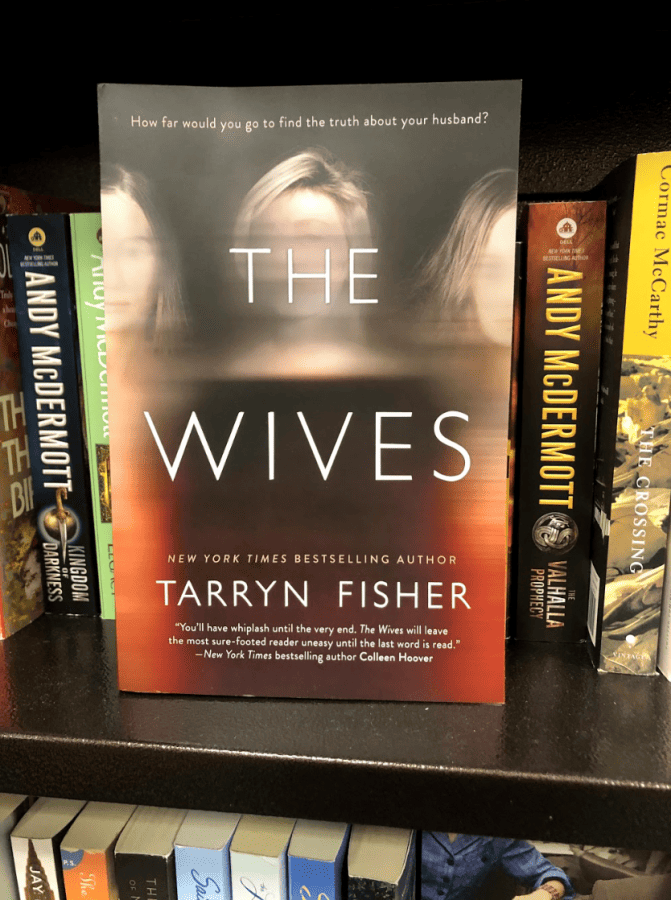From The Library: “The Wives” twists with every page
February 4, 2020
From The Library is a regular column reviewing New York Times Best Sellers.
I love watching horror movies. Or rather, I love reading horror movies. I am fascinated by horror, but I’m a wimp when it comes to jump scares – so much so that I often find myself reading the Wikipedia synopsis for the newest spooky flick rather than going to the theater. Despite hating the best of jump scares, I love horror movies for the mystery. That’s what good horror is after all: a whodunnit with more gore and ghouls.
When I picked up Tarryn Fisher’s 2019 novel “The Wives,” heralded as having twists at every page and a near-constant sense of foreboding, I was excited for a healthy tale of mystery, suspicion and thrills. What I got was somewhere adjacent to those expectations.
The protagonist – whose name is intentionally left unsaid for most of the book – is a young woman in an interesting domestic relationship: her husband has two other wives. Our protagonist knows very little about the details of her polygamist marriage. Her husband likes to keep the three women apart, having never met and being known to each other only by the days he spends with them in their respective cities across the Pacific Northwest: Monday, Tuesday and, our narrator, Thursday.
It’s an unspoken rule that the wives don’t snoop or ask too many questions about their husband’s other lives, but when Thursday finds an appointment reminder for a woman named Hannah in her husband’s pocket while doing laundry one day, she realizes she might not be as happy with the arrangement as she originally thought. What starts out as harmless Facebook stalking of Hannah, who Thursday is confident is one of the other wives, soon becomes an unraveling of not just her husband’s secrets, but of Thursday’s entire world.
“The Wives” is hard to get into. Thursday is one of the most unlikeable characters I’ve ever had the displeasure of reading. Her obsession with her husband makes it so her entire life surrounds the day he spends with her: Thursday. Despite having friends, a successful career as a nurse, and family, albeit a dysfunctional family, nearby, the first-person account is entirely Thursday moaning on chapter after chapter about how much she misses and loves her husband. Fisher has stated that the book is an allegory for a woman’s place in a patriarchal society, which I can appreciate, but I found her method of showcasing that trite and obvious.
As the mystery of the novel unfolds and Thursday becomes more and more unhinged and desperate for the truth, I found the book enjoyable and was excited to find out what surprises loomed around the next corner. Because the story is from Thursday’s perspective, Fisher leans heavily on the idea of an unreliable narrator and the end not answering all of the readers’ questions, which lends itself well to the story. I genuinely felt for Thursday by the end of the book, despite still finding her exhausting.
However, it was “The Wives” ending that held the other major problem I had with this book. Fisher delivered on the promise of twists: there are several major bombs that make the reader, like Thursday, question who and what to trust. But when the truth is finally revealed in the last chapters, I was left with whiplash – and not in a good way. I expected to find breadcrumbs throughout the book that subtly hinted to what was really going on in Thursday’s marriage but was instead left confused. Earlier events that completely contradicted the ending were yada-yada’d away with weak explanations that felt like lazy afterthoughts.
This is not to say that Fisher’s newest novel is without merits. She crafts an engaging universe that left me genuinely interested in the finale, especially after a climax straight out of a thrilling blockbuster.
With that in mind, would I recommend this book? Sure. Though the beginning was a slough and the ending was disappointing, the journey was one well suited for a fun, shallow read over a long weekend. Just don’t expect the great feminist allegory Fisher claims it as.
Grade: C+










